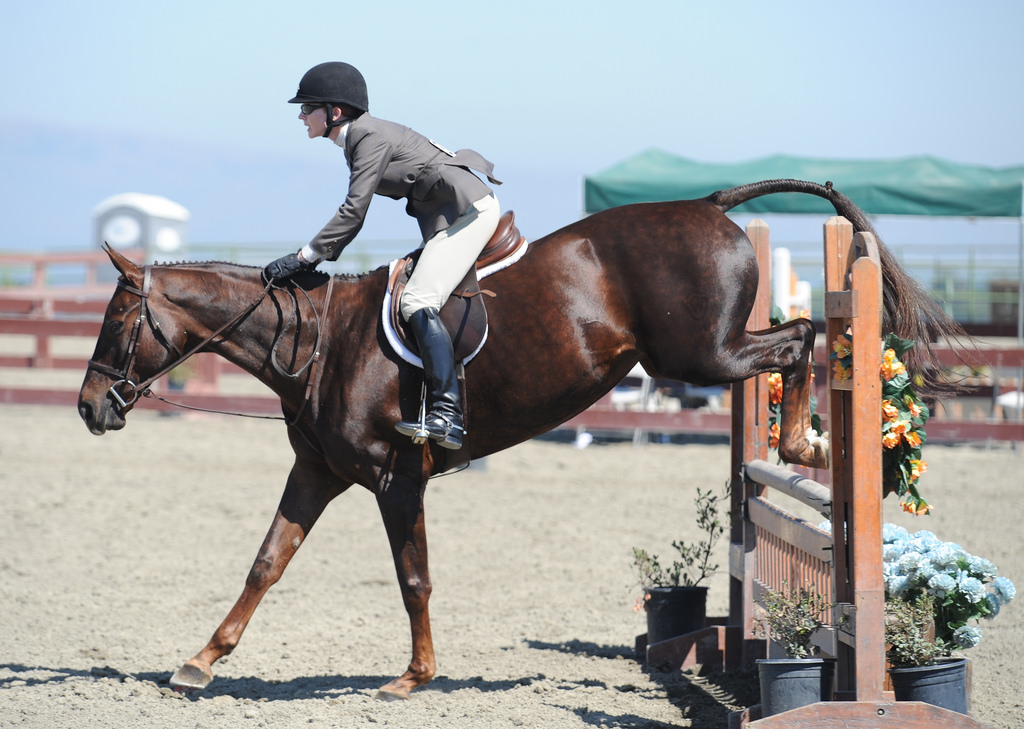
A rider participates in the Woodside Horse Show. PC: Joe Nuxoll/flickr/cc
It’s been a whirlwind 24 hours of announcements and revelations at the US Equestrian headquarters, as two major press releases came out within hours of each other. One was an open letter from US Equestrian President Murray Kessler concerning numerous changes to policy and procedure following a board meeting, and the second a brief statement regarding ongoing legalities with currently-suspended Larry Glefke and Kelley Farmer. Larry and Kelley’s legal team had requested the US Olympic Committee intervene based on their argument that the USEF mishandled their doping charges, but the USOC dismissed the case.
These two events seem fairly unrelated, but there is something of note that every due-paying member of the US Equestrian Federation ought to know, and ought to demand.
I’ve spent hours reading through the trial transcripts of the re-hearing held in June for the doping case against Larry and Kelley. I’m not a panel member, an elite rider, or a multi-millionaire owner with extensive front-to-back knowledge, but from my position as a USEF member, a dedicated fan of the sport and a professional commentator, I’m satisfied that the USEF proved their case sufficiently for the initial determination to be upheld. As I’ve said before, it’s deeply concerning and unsurprising that the defense never seemed to bother claiming their innocence – simply that the USEF didn’t do their job properly. The full transcripts don’t deny this narrative. (The defense provided these transcripts to Plaid Horse Magazine, which you can read here.)
Those who are determined to see fair play upheld got the proper outcome, and the guilty parties are paying for the price. But the transcripts do reveal undeniable weaknesses in the USEF’s handling of the whole incident, and as much as we should expect fair play from our competitors, we should equally expect exceptional scientific standards from the people who oversee our sport.
Repeatedly in the course of the two-day re-hearing, the defense’s legal counsel drilled specialists and members of the USEF labs about proper protocol, chain of handling, and why the A and B blood samples were so different from each other when they should be close to identical. In fact, the B samples had much higher concentrations of GABA than the A samples. They also drilled into why the USEF was so slow and unhelpful in providing samples and evidence to the defense – a critical component of a fair trial. And the USEF’s officials did not provide satisfactory answers for really any of this during their testimony.
The defense ultimately never convinced me (or the panel) that the USEF laboratories failings proved that Larry Glefke and Kelley Farmer were innocent. (And their repeated attempts to throw in that GABA really isn’t that bad certainly didn’t help.) They consider themselves victims of a witch hunt, as if the USEF delighted in bringing down a champion of their sport for all the world to see.
But the defense did convince me that the USEF labs could have done a better job of ensuring that people don’t get away with this behavior. There should be no question that samples were handled impeccably so that everyone in the sport can know what really happened without a shadow of a doubt.
US Equestrian has their heart in the right place, and they’re trying to get their ducks in a row. But with the reputation of our sport constantly in the crosshairs and horse’s welfare on the line, I hope that the near doubling of drug testing fees – from $8 to $15 for every horse at every event – doesn’t just mean more tests, but better protocol which eliminates any possibility of doubt should those tests reveal something nefarious.
I appreciate US Equestrian’s commitment to fair play and I am willing to put my money where my mouth is – all I ask, Mr. Kessler, is that you put my funds to good use ensuring that no one ever tries to fit through these laboratory loopholes again.
